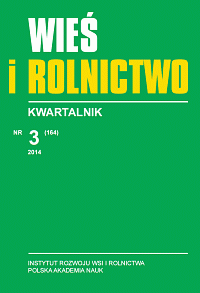Funkcjonowanie i rozwój rynku ekologicznych surowców żywnościowych w nowej perspektywie finansowej w latach 2014–2020
The functioning and development of the organic food raw materials market under the new financial plan for 2014–2020
Author(s): Piotr Szamrowski, Adam PawlewiczSubject(s): Economy
Published by: Instytut Rozwoju Wsi i Rolnictwa Polskiej Akademii Nauk
Keywords: organic farming; the prospect of financing the RDP 2014–2020; rolnictwo ekologiczne; perspektywa finansowania; PROW 2014–2020
Summary/Abstract: In preceding years the policy of reducing the negative human impact on the natural environment has influenced the development of organic farming. The number of producers of organic raw materials, the area of organic farming and the number of organic food-processing plants has risen significantly. The main factor of stimulating the development of this section of agricultural production is the system financial support through subsidies, which aims to compensate for the loss of benefits from resigning from production in a conventional manner. In the new EU financial plan for 2014–2020 under the RDP, however, there are going to be significant changes related to territorial limits, and the so-called digressiveness. A very important question is how, therefore, these changes will affect the development of this sector of the food market? The aim of this article is to present the status of organic farming in recent years and the possible changes that will occur in the market of organic food raw materials as a result the new financial plan for 2014–2020. W ostatnich latach polityka ograniczania negatywnego wpływu człowieka na środowisko przyrodnicze wpłynęła na rozwój rolnictwa ekologicznego. Znacznie wzrosła liczba producentów ekologicznych surowców żywnościowych, powierzchnia upraw ekologicznych oraz liczba przetwórców. Podstawowym czynnikiem pobudzającym rozwój tego systemu produkcji rolniczej jest system wspierania finansowego poprzez dopłaty, który ma za zadanie rekompensować utratę korzyści z rezygnacji z produkcji w sposób konwencjonalny. Jednak w nowej perspektywie finansowej Unii Europejskiej na lata 2014–2020 w PROW mają nastąpić istotne zmiany związane z np. limitami powierzchniowymi oraz tzw. degresywnością. Bardzo ważnym pytaniem jest zatem, jak zmiany te wpłyną na rozwój tego segmentu rynku żywnościowego? Celem artykułu jest przedstawienie stanu rolnictwa ekologicznego w ostatnich latach oraz możliwych zmian, jakie nastąpią na rynku ekologicznych surowców żywnościowych w nowej perspektywie finansowania na lata 2014–2020.
Journal: Wieś i Rolnictwo
- Issue Year: 164/2014
- Issue No: 3
- Page Range: 175-188
- Page Count: 14
- Language: Polish

